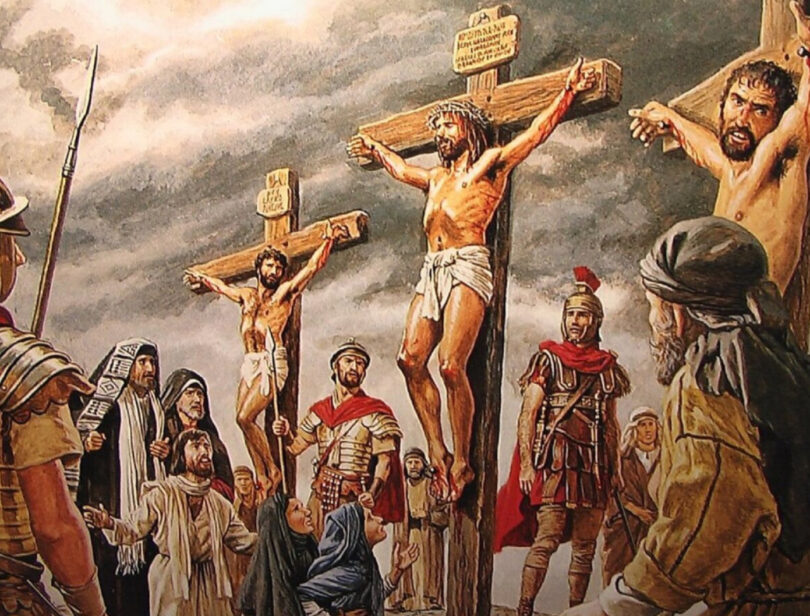The idea Jesus “paid the price” isn’t found in the Bible.
When you ask a Christian why Jesus died on the cross, they will almost automatically all answer “to pay for our sins.” This has become a deep rooted Christian belief that is widely taught in churches across the world. It has been accepted by many as Christian doctrine and been passed down from generation to generation. It’s a statement that has been accepted as fact, and one that is the foundation for many Christians.
Therefore it may come as a surprise then to say that the Bible doesn’t actually say this.
No matter how hard you search, you will not find a single passage in the entire Bible that says anything about Jesus paying the penalty for our sins. That’s because this is a “Christian belief” that the Bible doesn’t teach. Rather it was a theology created by humans.
The technical, theological name for this belief is “penal substitutionary atonement.” This theology was not part of Christian doctrine for the first 1,600 years after Jesus was crucified. The ideas was originated and developed by human beings who were having trouble understanding what the Bible teaches about how Jesus Christ saved humanity. They worked with what they could to better understand Jesus’ teachings, but missed the mark. This lead to a creation of a belief that wasn’t really based on the Bible.
There are some limited verses that speak about Jesus’ death in relation to our sins, but they only point to Jesus’ death somehow being related to our sins, but not that His death was a substitute or penalty because of our sins. His death did not scrub us clean of the sins we would commit in the future, or give us a “free for all” pass to do whatever we wanted. His death is not an excuse for our sins, which the “penal substitutionary atonement” alludes to.
This might seem like a nitpicky point, but the distinction that Jesus did not “pay” for our sins is vital in understanding salvation from the Christian perspective. There is a huge difference between the two ideas and it can dictate how Christians run their lives. In 1 Corinthians 15:3 the Bible reads: “Christ died for our sins in accordance with the scriptures.” Dying for our sins is not the same thing as dying to pay the penalty for our sins. If an innocent person dies because of another person’s wrongdoing, the person who did wrong is still guilty. Whenever the Bible talks about penalties, it always attaches them to the one who committed the offense. We are still held responsible for the sins we commit. At the end, each of us will have to pay for our deeds and there is no way around that. We are responsible for the totality of our actions.
When we look at the world now, we can tell that it has yet to be saved. There is still so much evil and hurt in this world and it’s easy to see simply by watching the news. Dying on the cross did not save us from the darkness of today’s society, and those who choose not to believe in Jesus and commit sins freely will answer for their actions. Jesus didn’t take the sins on Himself to set each of us free. It was only to open a pathway for us to forgive for them.
You may now be asking yourself, why then did Jesus die on the cross? This is an incredibly valid question to ask for many Christians. There are many political reasons as to why He died on the cross. Jesus died because he had offended those in power, challenged the status quo and refused to step aside. Jesus knew what He was doing, and that His actions would ultimately cause His death. He knew He was being viewed as a threat from the government at the time and predicted how His crucifixion would take place. As John 15:13 states, however, “No one has greater love than this, to lay down one’s life for one’s friends.”
Jesus died on the cross to show us what love truly looks like in action.
God is love, and the most important lesson that Jesus teaches us is that when we act in unloving ways, we distance ourselves from God. When asking yourself if something you do would be considered a sin, you should ask yourself if the action comes from a place of love. If it doesn’t, then it’s pulling you further away from living like Jesus.
Sin is what takes us further away from God, and those actions are void of love. The way Jesus led His life here one earth, He was able to show great examples of what love looks like. From feeding those who were hungry to befriending those who were cast out by society, Jesus went above and beyond to help those that needed it the most. He offered them love and hope when no one else would. His life was a perfect example of what love in action can do for others.
Jesus dying on the cross was a sacrifice He made for us. Him doing so gave us the opportunity to ask forgiveness for our sins, and enter into heaven once we had passed. We only have a pathway to heaven because of the loving sacrifice that Jesus made for the world. We are still responsible for what sins we commit, but by turning to Jesus we now have a way to take that weight off of our shoulders.
Jesus did die to save us from our sins, but it wasn’t a moment that wiped us clean from all responsibility. Instead, the Bible says that Jesus came to take away our sins (John 1:29), so that we would no longer be sinners. Jesus’ death showed us just how amazing God’s love is for us. He gave us an opportunity to escape the evils of the world and be reunited with our Father in heaven. Jesus’ death paved that avenue for us.
Megan Bailey is a content producer and digital marketing specialist specializing in social media marketing. She attended James Madison University where she received a degree in psychology.







